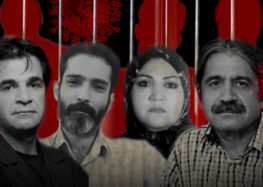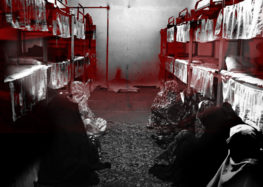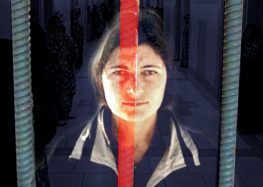Iran Releases Detained Stadium Ban Protesters as Hardliners Cheer on Discriminatory Policy
Four women arrested by agents of the Islamic Revolutionary Guard Corps (IRGC) on August 17, 2019, for trying to enter Azadi Stadium in Tehran to watch a men’s soccer game were released on bail from Gharchak Prison, south of the capital, two days later.
But the ban on women in sports arenas–condemned as discriminatory by FIFA and human rights groups–remains in place with the support of hardline politicians who oppose gender equality.
Forough Alaei, Zahra Khoshnavaz, Leili Maleki and Hedieh Marvasti—who tried to enter the stadium disguised as men—were applauded by Iran-based journalists and other Persian speakers for bravely resisting the Islamic Republic’s ban on women in stadiums, and came to be referred to as the “Azadi Girls.”
Azadi means freedom in Persian.
A photographer for the Donya-e-Eghesad newspaper, Alaei won first prize in the 2019 World Press Photo sports category. The photo, “Crying for Freedom,” features women sports fans standing outside the gates of a stadium in Iran.
Khoshnavaz is also a photographer, theater actor, and poet.
Iran is the only country in the world that bans women from sports stadiums.
The unofficial policy has been backed by religious conservatives and political hardliners in Iran since 1980, a year after the establishment of the Islamic Republic.
The ban is a violation of FIFA’s rules for teams that participate in international football events. Article 4 of FIFA’s statutes states that discrimination of any kind against a group of people is “strictly prohibited and punishable by suspension or expulsion.”
On August 18, following news of the women’s arrests, the Vice President for Women and Family Affairs Masoumeh Ebtekar suggested she supports seeing the ban lifted.
“There is absolutely no obstacle in this regard and we are hoping that our women will be able to safely enter arenas in the best possible condition within set parameters,” she said.
But other officials responded by denying responsibility.
“If these arrests really took place, they have nothing to do with the IFF,” said Iranian Football Federation (IFF) Spokesman Amir Mehdi Alavi.
FIFA Calls on Iran to Lift Discriminatory Ban for World Cup Qualifier Matches
In September 2018, FIFA’s Human Rights Advisory Board recommended that FIFA be “explicit about the timeframe in which it expects its Member Association [Iran] to align with FIFA’s human rights expectations.”
In June 2019, FIFA President Gianni Infantino said he would be “very grateful” if the Iranian government could inform him by July 15 of “concrete steps” it would be taking “to ensure that all Iranian and foreign women who wish to do so will be allowed to buy tickets and to attend the matches of the qualifiers for the FIFA World Cup Qatar 2022, which will start in September 2019.”
In a comment to the Center for Human Rights in Iran (CHRI) sent on August 21, a FIFA spokesperson said that the president of the Islamic Republic of Iran Football Federation (FFIRI) Mehdi Taj had responded to FIFA’s letter by noting that the “requested access has been approved by the FFIRI Executive Committee and that the matter has been taken up directly with the Minister of Sports and Youth in Iran, with a view to ensuring that all relevant approvals are obtained so that women will be able to attend the qualifiers of the FIFA World Cup.”
“In addition, we have asked for a clear timeline and assurances that all Iranian and foreign women who wish to attend matches of the qualifiers for the FIFA World Cup will be able to do so,” added the spokesperson.
On July 27, Maziar Nazemi, the Iranian Sports Ministry’s public relations director, announced that following an agreement with FIFA, “Azadi Stadium gates would probably soon be open to women football fans.”
Nazemi did not specify a date, and the ban remained in place one month after he made the comment.
Speaking on Iranian state television on August 3, the head of the IFF’s Appeals Committee, Dariush Mostafavi, said FIFA had given Iran until August 31 to allow women into stadiums.
“FIFA isn’t kidding around,” he said. “This is out of the government’s hands…. Women will soon be able to go to the stadium to watch soccer.”
Ban Remains in Place
Iranian officials have historically responded to domestic and international calls to lift the ban by relaxing it to allow a restricted number of women, such as the wives of team members, to watch games. But this measure has always been temporary.
Hardline and religious officials vehemently oppose lifting the ban, including Prosecutor General Mohammad Jafar Montazeri.
“Why does FIFA care if 10, 500, 1,000 or 5,000 spectators go to watch football?” he said. “Must some of them be women? Just because they are insisting on women entering the stadium, does that mean they feel sorry for our women?”
On August 6, Grand Ayatollah Nasser Makarem Shirazi declared that allowing women to join men inside the stadiums would cause “many problems.”
“The climate inside the stadiums is not suitable for women,” he said. “There is no doubt that when young people mingle freely, it causes many ethical and social problems.”
“Moreover, in some sports, men wear uniforms that are inappropriate for women to see,” he added. “Therefore, women should stay away from such events, especially when they can watch them on television and their presence is not necessary.”
Iranian Social Media Users Criticize Ban
Despite the risk of being imprisoned for publicly criticizing state policies, some Persian-speaking social media users condemned the women’s arrests and ridiculed the ban.
“Imagine going to prison and being asked: What were you accused of? And you say, Entering Azadi [Stadium]!” tweeted Azadeh Mokhtari, the social affairs editor of the state-funded Borna news agency.
Journalist Fatemeh Jamalpour wrote, “The Azadi Girls are in Gharchak Prison for going to the stadium to cheer on their favorite team… The way things are going, we could soon end up in Gharchak, too.”
In another tweet, Jamalpour praised Alaei for documenting the women’s struggle to get the ban lifted, “Forough is the future of journalism. Prison is not where Forough should be. Her place is in the stadium to take pictures of the match.”
Noting that the detained women had disguised themselves as men to enter the stadium, Borna reporter Mahboubeh Rostami asked, “What did these girls do wrong? Instead of Azadi Stadium, they have ended up in Gharchak Prison.”
Journalist Elahe Mohammadi tweeted, “I hope [FIFA chief] Infantino will not back down on suspending Iranian football. The freed girls will go back to Azadi Stadium. The totalitarians are well aware of that.”
Pahlavvan, another Iranian Twitter user, wrote, “Hollow Islamic logic: Going to the stadium is beneath women’s status, but it is not beneath them to go to prison for wanting to enter the stadium.”
Twitter user “liliummehr” meanwhile tweeted that all Iranians will one day look down on the ban as a barbaric policy:
“When future generations read about the mustached women and learn why they went to prison, will they laugh for hours or cry? Will they have the same feeling as us when we read in history books about Qajar King Agha Mohammad Khan, who created a hill from the eyes of the people he fought in one of his wars?”
Read this story in Persian.





